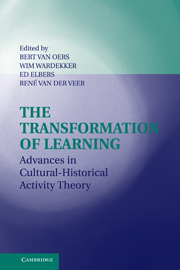Book contents
- Frontmatter
- Contents
- List of Contributors
- Preface
- INTRODUCTION
- SECTION ONE TENETS OF ACTIVITY THEORY
- SECTION TWO IDENTITY, DIVERSITY, AND INCLUSION
- SECTION THREE DYNAMICS OF ACTIVITY AND THE VARIATIONS OF LEARNING
- Introduction to Section Three: Learning in Social Settings: Challenges for Sociocultural and Activity Theory
- 15 Children's Learning through Participation in Institutional Practice: A Model from the Perspective of Cultural-Historical Psychology
- 16 Dialogue for Reasoning: Promoting Exploratory Talk and Problem Solving in the Primary Classroom
- 17 What Kinds of Tools and Resources Are Made Available to Students through Effective Guidance in a Student-Scientist Partnership Program?
- 18 Girls on the Sidelines: “Gendered” Development in Early Childhood Classrooms
- 19 Inscripting Predicates: Dealing with Meanings in Play
- 20 Pretend Play and Preschoolers
- Index
- References
15 - Children's Learning through Participation in Institutional Practice: A Model from the Perspective of Cultural-Historical Psychology
Published online by Cambridge University Press: 25 August 2009
- Frontmatter
- Contents
- List of Contributors
- Preface
- INTRODUCTION
- SECTION ONE TENETS OF ACTIVITY THEORY
- SECTION TWO IDENTITY, DIVERSITY, AND INCLUSION
- SECTION THREE DYNAMICS OF ACTIVITY AND THE VARIATIONS OF LEARNING
- Introduction to Section Three: Learning in Social Settings: Challenges for Sociocultural and Activity Theory
- 15 Children's Learning through Participation in Institutional Practice: A Model from the Perspective of Cultural-Historical Psychology
- 16 Dialogue for Reasoning: Promoting Exploratory Talk and Problem Solving in the Primary Classroom
- 17 What Kinds of Tools and Resources Are Made Available to Students through Effective Guidance in a Student-Scientist Partnership Program?
- 18 Girls on the Sidelines: “Gendered” Development in Early Childhood Classrooms
- 19 Inscripting Predicates: Dealing with Meanings in Play
- 20 Pretend Play and Preschoolers
- Index
- References
Summary
A child learns through participation with others in institutionalised activities. Learning takes place through the tasks and expectations that the child meets in these activities. But the child also contributes to the creation, change, and development of the activities and thereby to his own surroundings and learning conditions. The child is not only adapting to tasks and demands. Each person, whether a schoolchild, a teacher, or a parent, contributes to the activities in which he or she takes part and thereby, as a collective, creates the conditions for each other's activity.
In traditional classroom teaching, learning is seen as an individualised activity promoted by the teacher's lectures and formulation of questions and the students' answers and work with exercise material. Classmates are seen as interfering with the single child's learning process. In the more modern teaching types, where children can work together, teaching is still expected to relate to and measure each student's competence, and thereby learning is still conceptualised as a change in the child (Hedegaard, 2006). In these approaches, the product of the children's activity is not seen as important; what is conceptualised is the process of learning as change in the children's minds. This conceptualisation, by itself, gives a too-narrow perspective on learning activity, as I argue in this chapter.
Alternative approaches to teaching include those based on activity theory: Davydov's approach (1982, 1990) of “developmental teaching,” Lompscher's approach (1984, 1999) of “ascending from the abstract to the concrete,” and my own approach (Hedegaard, 2002) of “the double move in teaching.”
- Type
- Chapter
- Information
- The Transformation of LearningAdvances in Cultural-Historical Activity Theory, pp. 294 - 318Publisher: Cambridge University PressPrint publication year: 2008
References
- 4
- Cited by



